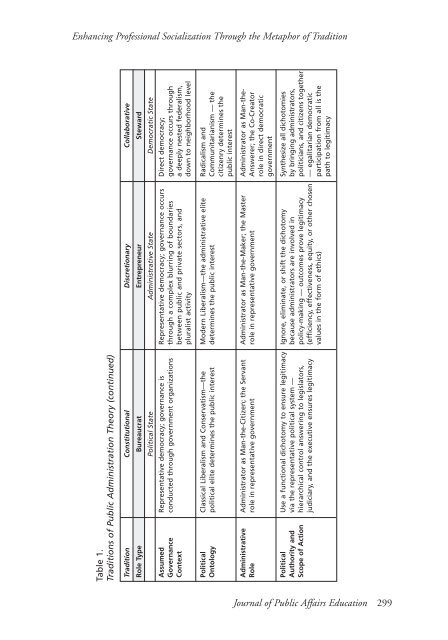JOURNAL OF PUBLIC AFFAIRS EDUCATION - naspaa
JOURNAL OF PUBLIC AFFAIRS EDUCATION - naspaa
JOURNAL OF PUBLIC AFFAIRS EDUCATION - naspaa
You also want an ePaper? Increase the reach of your titles
YUMPU automatically turns print PDFs into web optimized ePapers that Google loves.
Enhancing Professional Socialization Through the Metaphor of Tradition<br />
Table 1.<br />
Traditions of Public Administration Theory (continued)<br />
Tradition<br />
Role Type<br />
Assumed<br />
Governance<br />
Context<br />
Constitutional Discretionary Collaborative<br />
Bureaucrat Entrepreneur Steward<br />
Political State Administrative State Democratic State<br />
Representative democracy; governance is<br />
conducted through government organizations<br />
Representative democracy; governance occurs<br />
through a complex blurring of boundaries<br />
between public and private sectors, and<br />
pluralist activity<br />
Direct democracy;<br />
governance occurs through<br />
a deeply nested federalism,<br />
down to neighborhood level<br />
Political<br />
Ontology<br />
Classical Liberalism and Conservatism—the<br />
political elite determines the public interest<br />
Modern Liberalism—the administrative elite<br />
determines the public interest<br />
Radicalism and<br />
Communitarianism — the<br />
citizenry determines the<br />
public interest<br />
Administrative<br />
Role<br />
Administrator as Man-the-Citizen; the Servant<br />
role in representative government<br />
Administrator as Man-the-Maker; the Master<br />
role in representative government<br />
Administrator as Man-the-<br />
Answerer; the Co-Creator<br />
role in direct democratic<br />
government<br />
Political<br />
Authority and<br />
Scope of Action<br />
Use a functional dichotomy to ensure legitimacy<br />
via the representative political system —<br />
hierarchical control answering to legislators,<br />
judiciary, and the executive ensures legitimacy<br />
Ignore, eliminate, or shift the dichotomy<br />
because administrators are involved in<br />
policy-making — outcomes prove legitimacy<br />
(efficiency, effectiveness, equity, or other chosen<br />
values in the form of ethics)<br />
Synthesize all dichotomies<br />
by bringing administrators,<br />
politicians, and citizens together<br />
— egalitarian democratic<br />
participation from all is the<br />
path to legitimacy<br />
Journal of Public Affairs Education 299
















